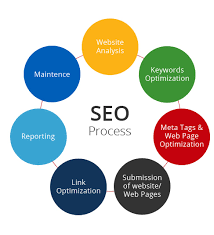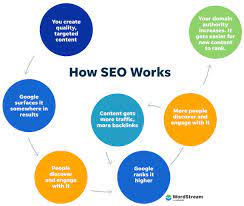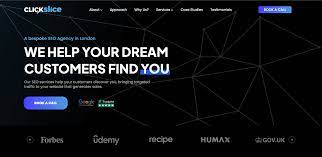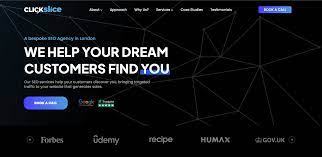Unlocking the Potential of Search Engine Marketing: A Guide to Success
The Power of Search Engine Marketing
Search Engine Marketing (SEM) is a powerful digital marketing strategy that aims to increase a website’s visibility in search engine results pages through paid advertising. SEM encompasses both Pay-Per-Click (PPC) advertising and Search Engine Optimization (SEO), offering businesses a comprehensive approach to reaching their target audience online.
Key Components of Search Engine Marketing:
- PPC Advertising: PPC ads appear at the top of search engine results pages, marked as ‘sponsored’ listings. Advertisers pay a fee each time their ad is clicked, making it a cost-effective way to drive targeted traffic to a website.
- Keyword Research: Identifying relevant keywords that potential customers use when searching for products or services is crucial for SEM success. By targeting the right keywords, businesses can attract qualified leads and improve conversion rates.
- Ad Copywriting: Crafting compelling ad copy that entices users to click is essential for driving engagement and increasing click-through rates. Well-written ad copy should be concise, persuasive, and relevant to the user’s search query.
- Landing Page Optimization: Landing pages play a critical role in converting ad clicks into leads or sales. Optimizing landing pages for relevance, speed, and user experience can significantly impact the success of SEM campaigns.
The Benefits of Search Engine Marketing:
SEM offers several advantages to businesses looking to enhance their online presence and drive measurable results:
- Immediate Results: With PPC advertising, businesses can start driving traffic to their website and generating leads almost instantly, providing a quick return on investment.
- Precise Targeting: SEM allows advertisers to target specific demographics, locations, and interests, ensuring that ads reach the most relevant audience for increased engagement.
- Data-Driven Insights: SEM platforms provide detailed analytics and reporting tools that enable businesses to track performance metrics such as click-through rates, conversions, and ROI, allowing for continuous optimization of campaigns.
- Flexibility & Control: Advertisers have full control over budget allocation, ad placements, and targeting options in SEM campaigns, giving them the flexibility to adjust strategies based on performance data.
In conclusion, Search Engine Marketing is a dynamic and effective digital marketing strategy that can help businesses boost their online visibility, attract qualified leads, and achieve their marketing goals. By leveraging the power of PPC advertising and SEO techniques, businesses can reach their target audience with precision and drive tangible results in today’s competitive online landscape.
Mastering Search Engine Marketing: Your Guide to SEM Essentials and Best Practices
- What is Search Engine Marketing (SEM)?
- How does Pay-Per-Click (PPC) advertising work in SEM?
- What is the difference between SEM and SEO?
- Why is keyword research important in Search Engine Marketing?
- How can businesses measure the success of their SEM campaigns?
- What are the benefits of using Google Ads for SEM?
- Is Search Engine Marketing suitable for small businesses?
- What factors influence the cost of running SEM campaigns?
- Are there any best practices to follow when creating ad copy for SEM?
What is Search Engine Marketing (SEM)?
Search Engine Marketing (SEM) refers to a comprehensive digital marketing strategy aimed at increasing a website’s visibility in search engine results pages through paid advertising methods such as Pay-Per-Click (PPC) ads. SEM combines PPC advertising with Search Engine Optimization (SEO) techniques to help businesses reach their target audience effectively. By utilising SEM, businesses can enhance their online presence, drive targeted traffic to their websites, and achieve measurable results in terms of lead generation and conversions.
How does Pay-Per-Click (PPC) advertising work in SEM?
Pay-Per-Click (PPC) advertising is a fundamental component of Search Engine Marketing (SEM) that operates on a simple yet effective principle. In PPC advertising, advertisers bid on specific keywords relevant to their target audience. When users search for these keywords on search engines like Google, ads related to those keywords are displayed at the top of the search results. Advertisers only pay when a user clicks on their ad, hence the name “pay-per-click.” This model ensures that advertisers only pay for actual clicks, making it a cost-effective way to drive targeted traffic to their websites and reach potential customers actively searching for their products or services.
What is the difference between SEM and SEO?
When it comes to digital marketing, a common question that arises is: What is the difference between Search Engine Marketing (SEM) and Search Engine Optimization (SEO)? SEM involves paid advertising strategies to increase a website’s visibility in search engine results pages, while SEO focuses on organic methods to improve a site’s ranking. SEM includes Pay-Per-Click (PPC) campaigns, where advertisers pay for each click on their ads, while SEO emphasises optimising content and website structure to enhance organic search visibility. Both SEM and SEO are essential components of a comprehensive digital marketing strategy, each offering unique benefits in driving traffic and boosting online presence.
Why is keyword research important in Search Engine Marketing?
Keyword research plays a pivotal role in Search Engine Marketing (SEM) due to its significance in driving targeted traffic and enhancing the effectiveness of online campaigns. By conducting thorough keyword research, marketers can identify the specific terms and phrases that potential customers use when searching for products or services online. This insight allows businesses to optimise their website content and PPC ads with relevant keywords, ensuring that they appear in search results when users are actively seeking their offerings. Ultimately, keyword research enables businesses to improve their visibility, attract qualified leads, and maximise their ROI in the competitive landscape of digital marketing.
How can businesses measure the success of their SEM campaigns?
Businesses can measure the success of their Search Engine Marketing (SEM) campaigns through a variety of key performance indicators (KPIs) that provide valuable insights into the effectiveness of their strategies. Metrics such as click-through rates, conversion rates, return on ad spend (ROAS), cost per acquisition (CPA), and overall website traffic can help businesses evaluate the impact of their SEM efforts. By analysing these KPIs and tracking data from SEM platforms, businesses can gain a comprehensive understanding of campaign performance, make informed decisions for optimisation, and ultimately gauge the return on investment (ROI) generated from their SEM initiatives.
What are the benefits of using Google Ads for SEM?
One of the frequently asked questions regarding search engine marketing is, “What are the benefits of using Google Ads for SEM?” Google Ads, as a key component of SEM, offers businesses a multitude of advantages. Firstly, Google Ads provides immediate visibility on Google’s search engine results pages, allowing businesses to reach a vast audience quickly. With precise targeting options, advertisers can tailor their ads to specific demographics, locations, and interests, ensuring maximum relevance and engagement. Furthermore, Google Ads offers detailed analytics and tracking tools that provide valuable insights into campaign performance, enabling businesses to make data-driven decisions and optimise their SEM strategies for optimal results. Overall, leveraging Google Ads within SEM empowers businesses to enhance their online presence effectively and drive measurable outcomes in the competitive digital landscape.
Is Search Engine Marketing suitable for small businesses?
Search Engine Marketing (SEM) can be highly beneficial for small businesses looking to enhance their online visibility and reach a targeted audience. While some may perceive SEM as a strategy reserved for larger enterprises with substantial marketing budgets, it is important to note that SEM offers flexibility in budget allocation and allows for precise targeting, making it accessible and cost-effective for small businesses. By leveraging SEM tactics such as Pay-Per-Click (PPC) advertising and strategic keyword targeting, small businesses can effectively compete with larger competitors in the digital space, drive relevant traffic to their websites, and ultimately increase conversions and sales. With its ability to deliver measurable results and provide valuable insights through analytics, Search Engine Marketing can indeed be a valuable tool for small businesses looking to grow their online presence.
What factors influence the cost of running SEM campaigns?
The cost of running Search Engine Marketing (SEM) campaigns is influenced by several key factors. Firstly, the competitiveness of the keywords targeted in the campaign plays a significant role in determining costs, as popular keywords often have higher bidding prices. Additionally, the quality score of ads, which considers factors like ad relevance and landing page experience, can impact costs by affecting ad placement and bid requirements. The chosen targeting options, such as geographic location, device type, and audience demographics, also influence campaign costs. Furthermore, the overall budget allocated to SEM campaigns and the desired goals for return on investment (ROI) are crucial factors that determine the cost-effectiveness and success of SEM efforts.
Are there any best practices to follow when creating ad copy for SEM?
When creating ad copy for Search Engine Marketing (SEM), it is essential to adhere to best practices to maximise the effectiveness of your campaigns. Some key guidelines include crafting concise and compelling copy that clearly communicates the value proposition of your offering. Utilising relevant keywords in your ad copy can improve ad relevance and attract qualified clicks. Additionally, incorporating a strong call-to-action can prompt users to take the desired action, such as clicking through to your website or making a purchase. Testing different variations of ad copy and analysing performance data can help refine your messaging for optimal results in SEM campaigns.









